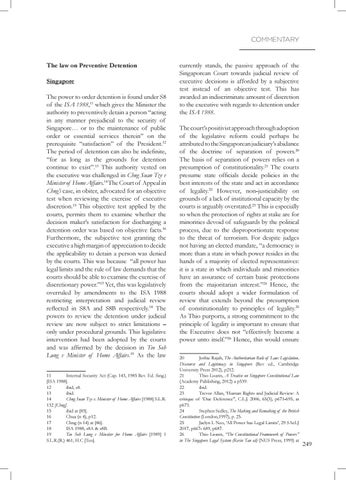COMMENTARY
The law on Preventive Detention Singapore The power to order detention is found under S8 of the ISA 1988,11 which gives the Minister the authority to preventively detain a person “acting in any manner prejudicial to the security of Singapore… or to the maintenance of public order or essential services therein” on the prerequisite “satisfaction” of the President.12 The period of detention can also be indefinite, “for as long as the grounds for detention continue to exist”.13 This authority vested on the executive was challenged in Chng Suan Tze v Minister of Home Affairs.14 The Court of Appeal in Chng’s case, in obiter, advocated for an objective test when reviewing the exercise of executive discretion.15 This objective test applied by the courts, permits them to examine whether the decision maker’s satisfaction for discharging a detention order was based on objective facts.16 Furthermore, the subjective test granting the executive a high margin of appreciation to decide the applicability to detain a person was denied by the courts. This was because “all power has legal limits and the rule of law demands that the courts should be able to examine the exercise of discretionary power.”17 Yet, this was legislatively overruled by amendments to the ISA 1988 restricting interpretation and judicial review reflected in S8A and S8B respectively.18 The powers to review the detention under judicial review are now subject to strict limitations – only under procedural grounds. This legislative intervention had been adopted by the courts and was affirmed by the decision in Teo Soh Lung v Minister of Home Affairs.19 As the law 11 Internal Security Act (Cap. 143, 1985 Rev. Ed. Sing.) [ISA 1988]. 12 ibid, s8. 13 ibid. 14 Chng Suan Tze v. Minister of Home Affairs [1988] S.L.R. 132 [Chng]. 15 ibid at [83]. 16 Chua (n 4), p12. 17 Chng (n 14) at [86]. 18 ISA 1988, s8A & s8B. 19 Teo Soh Lung v Minsiter for Home Affairs [1989] 1 S.L.R.(R.) 461, H.C [Teo].
currently stands, the passive approach of the Singaporean Court towards judicial review of executive decisions is afforded by a subjective test instead of an objective test. This has awarded an indiscriminate amount of discretion to the executive with regards to detention under the ISA 1988. The court’s positivist approach through adoption of the legislative reform could perhaps be attributed to the Singaporean judiciary’s abidance of the doctrine of separation of powers.20 The basis of separation of powers relies on a presumption of constitutionality.21 The courts presume state officials decide policies in the best interests of the state and act in accordance of legality.22 However, non-justiciability on grounds of a lack of institutional capacity by the courts is arguably overstated.23 This is especially so when the protection of rights at stake are for minorities devoid of safeguards by the political process, due to the disproportionate response to the threat of terrorism. For despite judges not having an elected mandate, “a democracy is more than a state in which power resides in the hands of a majority of elected representatives: it is a state in which individuals and minorities have an assurance of certain basic protections from the majoritarian interest.”24 Hence, the courts should adopt a wider formulation of review that extends beyond the presumption of constitutionality to principles of legality.25 As Thio purports, a strong commitment to the principle of legality is important to ensure that the Executive does not “effectively become a power unto itself.”26 Hence, this would ensure 20 Jothie Rajah, The Authoritarian Rule of Law: Legislation, Discourse and Legitimacy in Singapore (Rev ed., Cambridge University Press 2012), p212. 21 Thio Li-ann, A Treatise on Singapore Constitutional Law (Academy Publishing, 2012) a p539. 22 ibid. 23 Trevor Allan, ‘Human Rights and Judicial Review: A critique of ‘Due Deference’’, C.L.J. 2006, 65(3), p671-695, at p673. 24 Stephen Sedley, The Making and Remaking of the British Constitution (London,1997), p. 25. 25 Jaclyn L Neo, ‘All Power has Legal Limits’, 29 SAcLJ 2017, p667- 689, p687. 26 Thio Li-ann, “The Constitutional Framework of Powers” in The Singapore Legal System (Kevin Tan ed) (NUS Press, 1999) at
249
